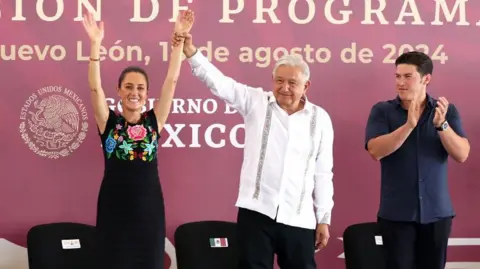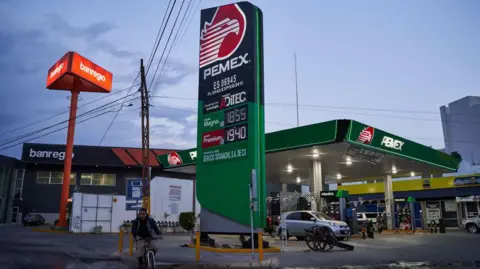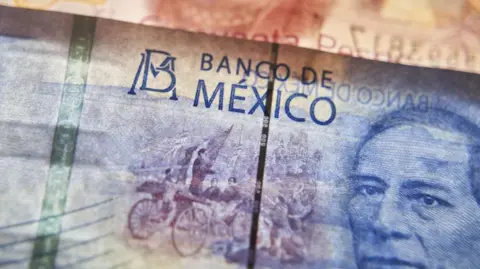
[ad_1]
 getty images
getty imagesMexico’s outgoing president, Andrés Manuel López Obrador, raised his hands in a joint show of victory after handing over the reins of power to Claudia Sheinbaum on October 1.
López Obrador – a hugely popular but controversial figure in Mexico – gave his political disciple more than just the presidency.
He inherits a nation and an economy that is performing well in some areas, and facing significant challenges in others.
The good news from his government’s perspective is that Mexico has strengthened its trade position with its neighbor to the north, and has displaced China as the US. Largest trading partner.
Mexico has benefited from “nearshoring” – that is, the relocation of American and Asian companies from China to northern Mexico to circumvent punitive US tariffs on Chinese exports.
“Mexico has always been attractive to capital flows because of our geographic location, our free trade agreements with North America, our workforce,” former Mexican trade negotiator Juan Carlos Bécquer Pineda told me before the election.
“But over the last few years, it seems that if you [a foreign firm] If you want to do business with the US you need some kind of foothold in Mexico.”
He believes the outlook is optimistic, pointing to Amazon’s recent announcement that it will invest $5 billion (£3.8 billion) in Mexico over the next 15 years, and an additional $1 billion by German carmaker Volkswagen. Will invest. Mr Baker Pineda also cites promising plans from South African, Japanese and Chinese companies.
Critics are less convinced that shifting manufacturing from Asia to northern Mexico benefits the Mexican economy rather than boosting the companies involved. Mr. Baker Pineda believes that the key lies in making the right corporate and government decisions to sustain this trend in this country for the long term.
When it comes to the immediate economic problems facing President Sheinbaum, the most pressing are on state energy company Pemex. It has a debt of about $100 billion, making it the world’s most indebted oil company.
“Debt is a problem not only for Pemex but for Mexico as a whole,” says Fernanda Ballesteros, Mexico country manager for the Natural Resource Governance Institute.
In recent years, the López Obrador administration has reduced the amount of tax Pemex pays to the government. it has been disconnected From 60% to 30%.
At the same time, the outgoing government gave Pemex several cash injections, which López Obrador says he will Would love to see it continue.
However, a steady decline in productivity at Pemex in recent years has further complicated the financing of the state-owned energy giant, which employs about 1.3 million people according to the government’s own figures.
 getty images
getty images“President López Obrador’s policies and priorities were to double down on fossil fuels and give unconditional support to Pemex,” Ms Ballesteros says. He argues that the company is now poorly positioned to make the necessary transition to cleaner and more efficient energy in the coming decades.
“Over the past six years, 90% of Pemex’s infrastructure investments have gone into the acquisition of a new refinery in Dos Bocas in Tabasco state and a refinery in Deer Park in Texas.”
The government says it is on track to achieve its target of complete fuel self-sufficiency by the first quarter of 2025. However, Pemex’s ongoing financial difficulties mean that the Sheinbaum administration’s hands are tied in repaying the huge debt.
Environmental expert Eugenio Fernandez Vazquez says Pemex poses a “big challenge” to Sheinbaum. He explains, “Not only in dealing with the oil industry, which is huge in terms of Mexico’s GDP, but also in removing the burden of Pemex’s huge debt from the public’s shoulders.”
In order to get Pemex to sell more of its products, he says, “which are clearly fossil fuel and oil-based, Sheinbaum will have to strike a difficult balance, while simultaneously addressing Mexico’s climate change responsibilities and the urgent consequences in our cities.” Issues have to be dealt with, such as air pollution”.
For a president revered as Mexico’s most environmentally conscious leader – before entering politics, Sheinbaum was an accomplished environmental engineer – it must be acknowledged. Especially when billions of public money are also being spent to prop up a greenhouse gas emitting giant.
Within the scope of Mexico’s complicated relationship with its northern neighbor, President Sheinbaum faces two very different potential partners in Washington – either Kamala Harris as America’s first female president or a second Trump presidency.
Whoever wins in November, there are some thorny cross-border issues, whether trade or undocumented immigration, illegal gun trafficking into Mexico, or fentanyl into the US.
Additionally, the United States-Mexico-Canada Agreement (USMCA) free trade deal is up for renegotiation in 2026, with everything from minor changes to major rewrites possible.
The USMCA was introduced in 2020, when it replaced the previous North American Free Trade Agreement between the three countries.
Sheinbaum will also have to keep an eye on the peso. In the days following his election victory in June, the currency fell against the dollar.
This was largely in response to the outgoing President’s decision to move forward with a massive reform of the country’s judicial system, under which all 7,000 judges and magistrates in Mexico would be elected by popular vote. This plan also has the support of Sheinbaum.
Washington’s disapproval of this measure, as publicly expressed by US Ambassador to Mexico Ken Salazar, suggested that it could complicate, even jeopardize, parts of the USMCA renegotiations. . Relations between Ambassador Salazar and the new administration are already very bad.
 getty images
getty imagesDiplomatic disputes aside, reconciling the new constitutional rules with the legal requirements of the free trade agreement may prove more difficult than first anticipated.
Still, these are the first days of President Sheinbaum’s administration. As part of his predecessor’s legacy, he enjoys an almost unprecedented level of support with the ruling party across the country and is in an unassailable position.
Her key election promise – expanding López Obrador’s social programs into pensions, family stipends and student grants, and building what she calls the “second floor” of her political project – won her the support of millions of Mexicans.
She can also rely on a loyal Congress and, after reform, potentially control the judiciary.
Holding such a powerful position is a luxury that supporters and critics alike hope she will use to properly address some of Mexico’s main economic constraints.
[ad_2]
Source link




![NZ v AUS [W] 2024/25, New Zealand Women vs Australia Women 2nd ODI, Wellington Match Report, December 21, 2024 NZ v AUS [W] 2024/25, New Zealand Women vs Australia Women 2nd ODI, Wellington Match Report, December 21, 2024](https://i3.wp.com/img1.hscicdn.com/image/upload/f_auto/lsci/db/PICTURES/CMS/393400/393416.6.jpg?w=1200&resize=1200,0&ssl=1)




